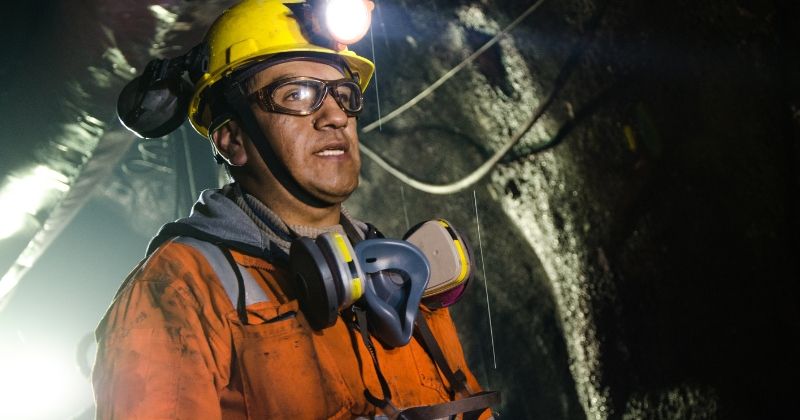11 Highest Paying Jobs In Canada Without A Degree 2023
Categories: Canada
One of the biggest myths in society is that you need a university degree to earn a decent living.
This is evident when you look at Canada’s over-educated workforce and the number of graduates who are working in lower-paying positions that are often unrelated to their field of study.
The reality is that there are plenty of high-paying jobs in Canada that you can get without a post-secondary education.
If you’re looking for the highest paying jobs in Canada without a degree, then you’re in the right spot! From on-the-job training to quick training courses, I’ll share some of the top jobs you can get without a bachelor’s degree.
Myth: You Need A University Degree To Get Paid Well
Before I start off, I’d like to be fair to both sides.
I’m not saying that you shouldn’t go to college and pursue your education. Personally, I obtained my Bachelor of Commerce from the University of Alberta before pursuing further certification to become a Chartered Financial Analyst (CFA).
A university degree can certainly help you earn more and, in some cases, is required for certain professional fields such as:
- Law
- Architecture
- Engineering
- Medical
If you’re set on pursuing a career path in one of those fields, you’ll need a lot more than a high school diploma. However, if you’re not set on a professional career that requires a college degree, there’s a good chance that you may not need a degree at all.
There are a host of high-paying, underrated jobs that simply require certification or that provide on-the-job training courses to teach you everything that you need to know.
For example, a high school graduate can earn over $20 per hour as a home support worker and is only required to receive basic first aid certification, which can be acquired in less than a week from the Canadian Red Cross. That’s a bit better than earning minimum wage, given the relatively brief training required.
High-Paying Jobs You Can Get Without A Bachelor’s Degree
Earning $20 per hour straight out of secondary school isn’t a bad start. But what if I told you that you could earn up to $30 per hour or more without a degree?
Whether you have previous experience or you’re just getting started, or if you enjoy hands-on work or technical work, the following are some of the highest-paying career fields that you can get into without a university education.
1. Welding

- Welding Average Salary: $23.36 per hour
- Education/Certification Required: 3 years of apprenticeship or a combination of apprenticeship and trade classes
Welders in Canada typically earn between $20 and $30 per hour, depending on their level of experience, the job requirements, and their area of expertise. Skilled tradesmen, such as pipe welders, can earn up to $40 per hour or more.
Generally speaking, most welding jobs require applicants to have completed at least a three-year apprenticeship program or have attended a trade course (which can take between one and three years to complete).
Welder apprentices typically earn between $18 and $22 per hour as well, which isn’t a bad wage while you’re still in the learning phase.
The great thing about this career path is that there is also ample room for side gig income, as plenty of Canadians need small welding repairs on their cars, ladders, trailers, or other equipment.
There’s also lots of room for career and income growth, as you can get certified in new areas and earn even more.
2. Professional Sales


If you have great communication skills, enjoy meeting and talking to new people, and like the idea of a career where you determine how much you earn, consider pursuing a job as a professional salesperson.
For example, car salesmen in Canada can earn up to $24.56 per hour, not including commissions earned on sales that they close. I’ve met several automotive sales professionals who pull in almost six figures per year, combining their hourly wages and commissions.
If selling cars isn’t your cup of tea, there are plenty of other industries that are in constant need of skilled sales professionals, including:
- Home services
- Software and cybersecurity
- Telecommunications
- Professional services (legal, medical, etc.)
- Marketing
As a professional salesperson, you’ll spend a lot of time making phone calls and/or attending networking events to acquire new leads for a company, follow up with “warm” leads, and close the deal with “hot” leads.
Many companies offer their sales team a fair base wage along with hefty commissions (which is where the real money is).
That being said, sales can be very challenging. There will be weeks and months when you won’t sell anything, which can be very discouraging. However, your first big commission is a feeling unlike anything else.
Mastering sales is also a great skill to learn if you want to pursue entrepreneurship, as you’ll constantly be required to sell your own product or service to potential clients.
3. Construction Manager


- Construction Manager Average Salary: $46.15 per hour
- Education/Certification Required: GED or high school diploma
Construction managers are responsible for managing construction workers on construction sites. Although some attend college and study construction management, it’s just as common to see managers who’ve worked their way up the ladder through hard work and experience.
If you can develop a solid reputation as a reliable worker and prove to your employers that you’re a good leader and team player, you could work your way up from a general labour position to a management position in several years.
4. Truck Driver


- Truck Driver Average Salary: $28.21 per hour
- Education/Certification Required: GED plus Commercial Drivers License (CDL)
If you enjoy driving and don’t mind spending your days on the road, pursuing a career as a truck driver can become a lucrative career.
To begin with, you’ll need to attend a truck driver training course (which typically takes about eight weeks to complete), which will teach you everything you need to know in order to pass your test and obtain your CDL.
Once you have your CDL, you can drive 18-wheelers cross-country or even become a garbage truck driver in your local city. To maintain your CDL, it’s imperative that you keep a clean driving record.
Often truck drivers will spend several years saving up money to purchase/finance their own truck and start their own trucking business. At this point, you stand to earn significantly more than standard truck drivers.
5. Web Developer


- Web Developer Average Salary: $37.49 per hour
- Education/Certification Required: None
Web developers help businesses and individuals build and update websites and web-based applications (such as Netflix or Amazon Prime).
Although many jobs don’t require a degree, it’s worth pursuing a certification course or coding “bootcamps” like Lighthouse Labs, where you can learn the basics of HTML, CSS, Javascript, and other web coding languages.
6. Dental Assistant


- Dental Assistant Average Salary: $28.90 per hour
- Education/Certification Required: 8 to 12-month dental assistant certification program
Dental assistants help dentists in everything from basic teeth cleaning to oral surgery. While you won’t be performing complex work yourself, you’ll help dentists with tasks such as:
- Taking X-rays
- Brushing/flossing patients’ teeth
- Cleaning dental tools
- Handling patient records
In addition to a great starting salary, dental assistants often receive excellent benefits, such as low-cost dental insurance premiums.
7. Air Traffic Controller


- Air Traffic Controller Average Salary:$84.12 per hour
- Education/Certification Required: GED or high school diploma
Although many air traffic controllers have a post-secondary education in aviation or related fields, it’s also possible to work your way up into the position by combining work experience (at an airport) with various training and certification programs.
Air traffic controllers stand to earn an incredible salary. However, there is a lot of stress associated with the job, as lives are on the line every minute of your job. One misdirected takeoff or landing could spell disaster, so you should only pursue this job if you have high-stress management skills.
8. Crane Operator


- Crane Operator Average Salary: $31.97 per hour
- Education/Certification Required: GED, plus crane operator certification
If you don’t mind heights and enjoy working by yourself, becoming a crane operator can be a fun, high-paying job. Before you’re allowed to operate cranes, you’ll need to complete “crane school,” which is a certification program that typically takes four to eight weeks to complete.
After obtaining your basic crane operator certification, you may also choose to pursue additional skills, so you can earn more operating overhead, boom trucks, bridge cranes, and others. These secondary certifications typically take a week or less to complete.
Before you start earning good money, you may have to spend two to five years building experience working with smaller cranes or assisting more experienced crane operators.
9. Train Conductor


- Train Conductor Average Salary:$45.96 per hour
- Education/Certification Required: GED plus learning the Canadian Rail Operating Rules
If you have a passion for locomotives and railway systems, pursuing a career as a train conductor can be a very lucrative career. The best part is that you need very little education to get into this field, and many rail companies are willing to pay for new recruits to obtain their certification and training.
In addition to your GED, you’ll need to complete a course and test on the Canadian Rail Operating Rules, which will teach you everything you need in order to conduct commercial and passenger trains.
10. Miner


- Miner Average Annual Salary:$37.94 per hour
- Education/Certification Required: GED plus miner certification program
Modern-day mining is much cleaner than the dirty coal mines of the past. However, it’s still a potentially dangerous career that involves a lot of high-tech machinery.
As such, mining is strictly regulated in Canada, and most mining positions require recruits to complete a mining certification program, where they’ll learn all of the skills and safety rules required to mine various metals.
Alberta and B.C. have the highest miner salaries by province, and miners here earn a median hourly income of $62 to $63, while miners in other provinces typically earn $30 to $45 per hour.
11. Electrician


- Electrician Average Salary:$35.46 per hour
- Education/Certification Required: GED, plus apprenticeship and/or certification program
As an electrician, you’ll be responsible for building and repairing electrical systems. Depending on the career path you take, you could find yourself replacing household lights and appliances or laying conduits in high-rise construction sites.
Most electricians start as apprentices, working under a licensed journeyman or master electrician. During this time, you’ll learn valuable on-the-job skills and study the technical skills you need to pass your journeyman electrician test and obtain your license.
Electricians have always been in high demand and are needed throughout the country. There’s also lots of room for upward growth and job variety so that you won’t get bored with this career.
Tip: Get Your High School Diploma
Before you get too excited and decide to drop out of secondary school, I have one very important point to mention.
Many of the highest-paying jobs you can get without a degree require certification or specialized training. Often a GED or high school diploma is required to apply for these certification programs to begin with.
Although you may not need a college degree to earn good money, I recommend completing secondary school and getting your high school diploma or GED, as this will make it a lot easier to get into training and certification programs that can lead to high-paying jobs in Canada.
Even if a certain job doesn’t require specialized training, having a high school diploma or GED makes your resume look much better than an applicant without one.
What’s The Highest Paying Job Without A Degree?
The highest-paying job you can get without a degree in Canada is as an air traffic controller.
Money shouldn’t be your only motive for pursuing a career, though. Ideally, you should choose a career that inspires you and teaches you skills that you can take with you throughout your life.
Pursuing a career that offers room for upward growth is also good, so you can fill new positions and earn more as you become more experienced.
Pursuing a skills or trade certification is the best way to ensure that you’re able to find reliable, good-paying jobs in Canada. If you’re not ready to take the leap into education, consider applying for a job as an apprentice or helper, as this will give you time to determine whether you enjoy the work.
It can also be helpful to talk with other professionals in the industry and get their take on things.
Did you know that you can make up to six figures (or more) working remotely from your computer? Keep on reading to see my list of the best six-figure remote careers!
